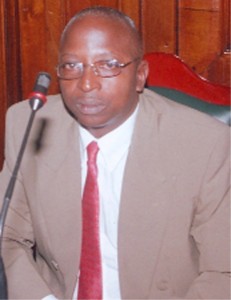–addresses child labour
The National Assembly recently passed two bills which seek to improve the conditions of workers locally. The two pieces of legislation, the Occupational Safety and Health (Amendment) Bill and the Holidays with Pay (Amendment) Bill were passed with the full support of the House.

The Occupational Safety and Health (Amendment) Bill amends a previous Act of 1997, while the second bill made amendments to the Holidays with Pay Act of 1995.
Labour Minister Manzoor Nadir piloted the Occupational Safety and Health (Amendment) Bill through the House and explained that the amendments “though innocuous, do provide a potent instrument in our programme to make workplaces safer and healthier.”
He pointed out that over the last ten years more than 70 persons had died in the workplace, and for this year six persons had perished in such incidents. This bill, he said, seeks to strengthen the capacity of the ministry to lay charges and to ensure the prosecution of persons who break the law with regard to occupational safety and health. The bill will empower the Chief Occupational Safety and Health Officer to institute prosecutions where necessary; under the current law, only the permanent secretary within the labour ministry could institute prosecutions.

The minister also said that the legislation makes it illegal for persons to employ children under the age of 15, which is intended as another move to protect the nation’s children.
Everall Franklin of GAP/ROAR expressed support for the bill but called for greater attention to be paid to the quality of imported safety equipment. He said there had been an influx of very substandard and dangerous protective gear being sold at various outlets. Franklin also called for greater regulation by the ministry and the Guyana National Bureau of Standards of imported safety equipment.
PNCR-1G MP Basil Williams supported the bill and acknowledged that it seeks to protect the rights of children. But he acknowledged that in many cases, children in single parent families are required to work to help the family to survive. He said the government needs to institute a social programme to assist such families.

Chairman of the Alliance For Change Khemraj Ramjattan called for the bill in its amended form to be effectively implemented in both private and public agencies whenever there was need. He said that all work-related incidents especially those that resulted in death needed to be investigated.
Nadir, before the third reading of the bill, said that workplace safety was the responsibility of both the employer and employee. He also said that persons who suffer injuries at workplaces should not hurriedly enter into agreements with management. He said the ministry was there to offer assistance and pointed out that there was also the option of private counsel.
Meanwhile, the Holidays with Pay (Amendment) Bill was described as one introduced “to tidy up and strengthen the hand of the judiciary to ensure workers get their due.” He said that although in the existing legislation magistrates had power to intervene in such matters, they had been reluctant to rule, although they were empowered to do so. The bill seeks to ensure that magistrates rule on the entitlements of workers who may be owed monies by their employers.
The bill also made an amendment to substitute the word ‘leave’ whenever ‘holidays’ is mentioned in the original Act. According to the minister, this had led to some confusion in the past.
Williams described this piece of legislation as an act of “tokenism” but said that his party was willing to support any venture that was in the best interest of workers. He, however, opined that the bill did nothing to substantially change the Holidays with Pay Act of 1995.
PPP/C MP Norman Whittaker, responding to Williams, said the bill was an act that reflected a genuine interest in the rights of workers. Underscoring the importance of the bill, he said it addressed leave, court issues and provides other avenues through which summonses could be issued under the act.








